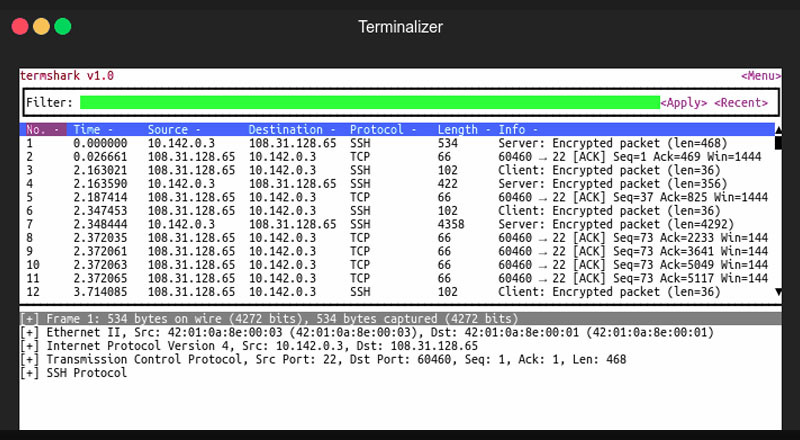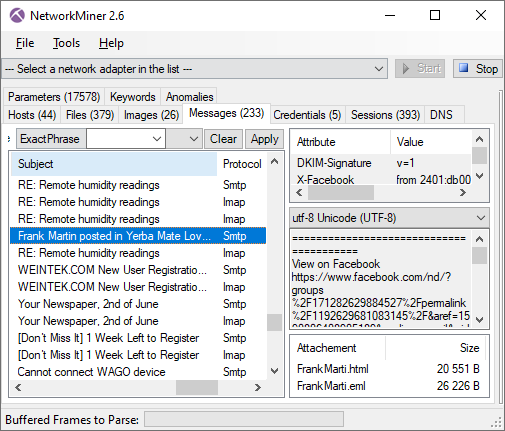To work, Termshark needs TShark to be installed. This is part of Wireshark, and on macOS you can install it using brew (brew install wireshark). On Linux the package name depends on the distribution you're using. For example it's tshark on Debian / Ubuntu, while the package that provides TShark on Fedora is called wireshark-cli. Ksniff — all the goodness of Wireshark, running in Kubernetes. According to the project’s GitHub repo, ksniff is a “plugin to ease sniffing on kubernetes pods using tcpdump and wireshark”. I’ve used tcpdump and Wireshark to inspect network traffic for many years, but I have found it somewhat tricky to use within Kubernetes.
- Apr 07, 2021 linuxbrew wireshark Addeddate 2021-04-07 20:32:47 Identifier linuxbrew-wireshark Scanner Internet Archive Python library 1.9.4. Plus-circle Add Review.
- By Date By Thread. Current thread: Installing wireshark on MacOS Catalina via brew varun siripurapu (Mar 13). Re: Installing wireshark on MacOS Catalina via brew Guy Harris (Mar 13).
- Sep 18, 2020 Wireshark is a packet sniffer and analysis tool. It captures network traffic on the local network and stores that data for offline analysis. Wireshark captures network traffic from Ethernet, Bluetooth, Wireless (IEEE.802.11), Token Ring, Frame Relay connections, and more.
Table of Contents
Quicklinks: Wireshark: Installation Chapter


Install Wireshark with a Package Manager
Where available, prefer your package manager. Note that Wireshark v3 is not currently available on many Linux package managers (this will change soon).
| System | Install Command | Latest Version |
|---|---|---|
| Linux | $PkgManager install wireshark | 2.6.8 and below |
| Macos | brew install --cask wireshark | 3.0.2 |
| Windows | choco install wireshark | 3.0.2 |
Installing tshark Only
Note: If you have not used tshark before, you should install the wiresharkpackage as above before limiting yourself to the CLI.
If you want to install just tshark and no Qt/GUI components, this is possible onvarious linux distributions. The package is called tshark or wireshark-clidepending on the platform.
Install the package tshark:
- Alpine >= 3.9
- Debian >= 9
- FreeBSD >= 11
- OpenMandriva >= 3.0
- PCLinuxOS
- Ubuntu >= 14.04
Install the package wireshark-cli.
- Arch Linux
- CentOS >= 8
- Fedora >= 30
- RedHat
For up-to-date package information, check the package registry fortshark andwireshark-cli
Install with a package
To get the most up-to-date official packages, visit Wireshark’s Download Page.
There are multiple packages available from Wireshark’s download page. The installation is simple, but make sure to check the components that.
Install from Source
Linux currently does not have packages in official repositories, so if you want the latest, you have to build it (this will likely change soon).
Linux, v3.0.0
You need to install from source to get v3 on Linux. This will get a clean system on Ubuntu18.04 to an install:

If you are on a different system, only the last 3 steps apply. Make sure thatyou’ve satisfied the other dependencies. cmake will kindly let you know if youhaven’t.
Check Installation
1. Check Version
If the version doesn’t match the expected one, you may want toinstall from source or use Wireshark’s download page.
2. Check Interfaces
tshark -D will list all interfaces that it sees.
dumpcap does not see and cannot capture on virtual interfaces. This means that dumpcap -D will show fewer interfaces than tshark -D.
Different systems will report different interfaces. tshark will treat the first interface as the default interface and capture from it by default.In other words, tshark aliases to tshark -i 1. You may need to use sudo depending on your installation.Default interfaces on installs of macos, windows, linux, and freebsd are shown below.
3. Test Live Capture
Entering the tshark command should immediately start capturing packets on the default interface. If you donot see packets, check out Choosing an Interface.
4. Make Sure Utilities are on $PATH
Wireshark Brew 10
Setting up your environment should be done once and done well. There are a coupleAdditional work is usually necessary to make sure all utilities are on the path.
Wireshark Brew 2
bash
You can verify whether all are installed with the following:
If a util is installed but not on your $PATH, you can use find / -name $util 2>/dev/nullto find out where it may be. For example, on Linux for 3.0.0, extcap tools areat /usr/lib/x86_64-linux-gnu/wireshark/extcap. To add them to your path, useecho 'export PATH=$PATH:$folder' >> ~/.profile.
Powershell on Windows
Currently, extcap utils need to bemoved from Wiresharkextcap => Wiresharkto be useable. If you have not added your %Program Files% to your $PATH, you cando that with an Admin user:
[Environment]::SetEnvironmentVariable('PATH', '$PATH;$ENV:ProgramFilesWireshark', 'Machine')

Wireshark Previous Version
You will need to reopen Powershell for the $PATH to be updated.
